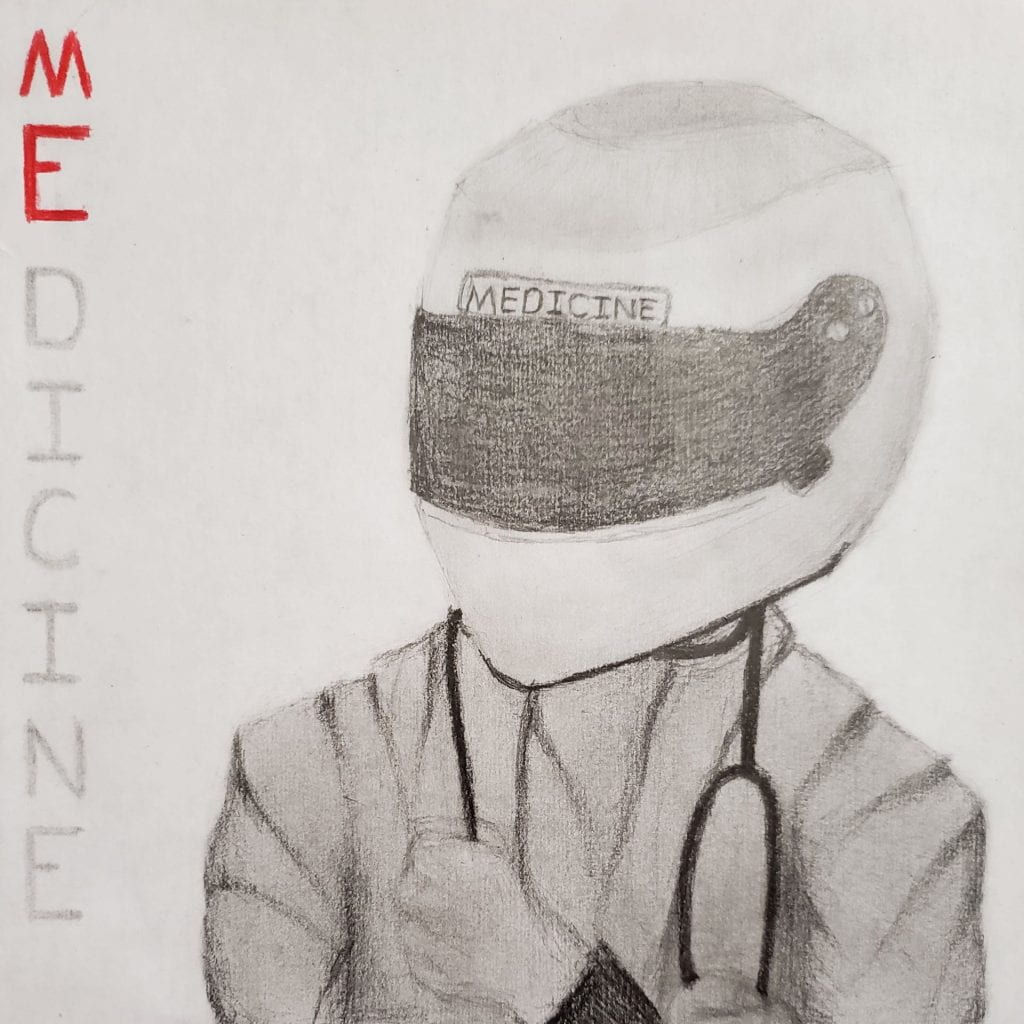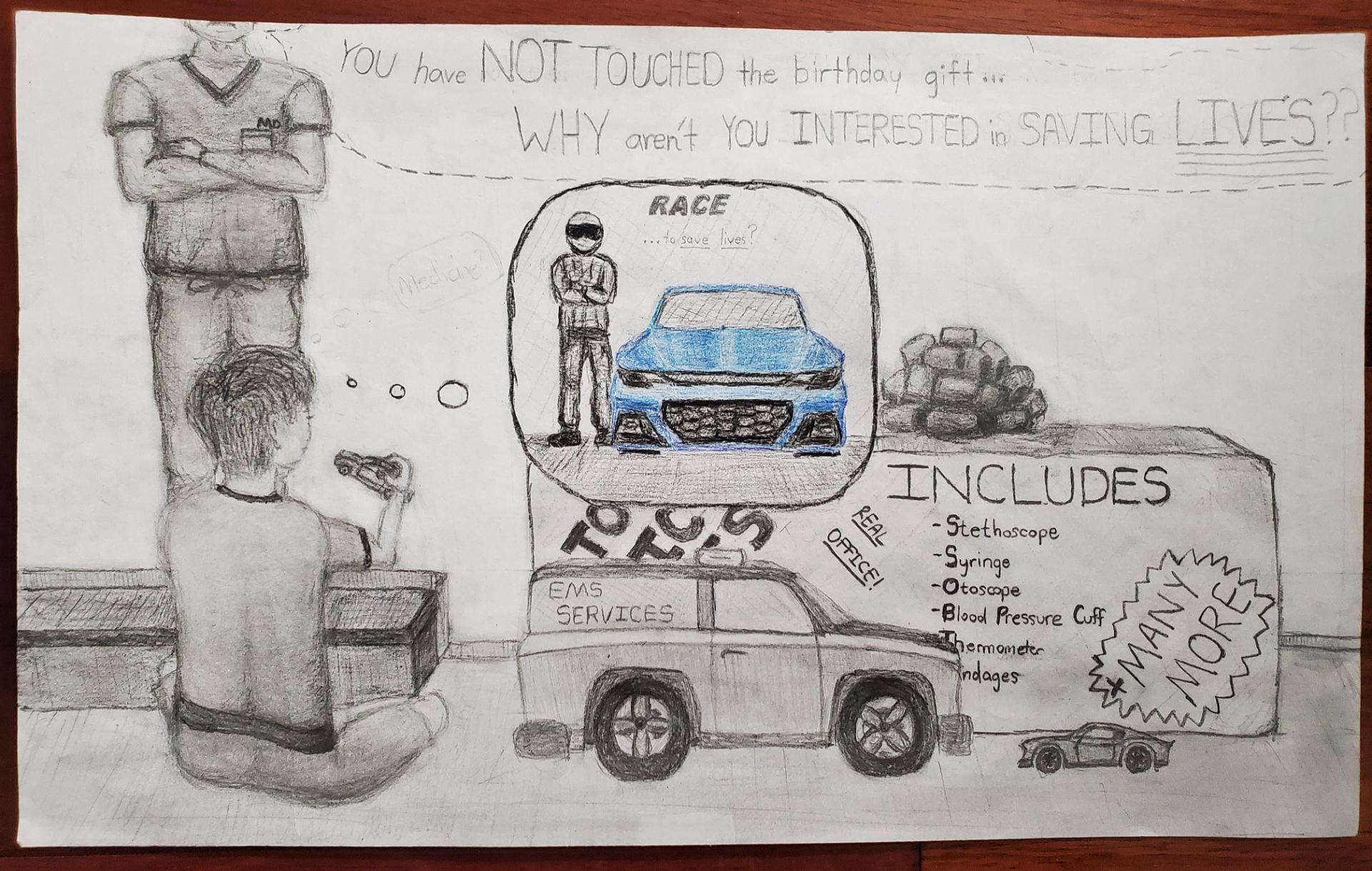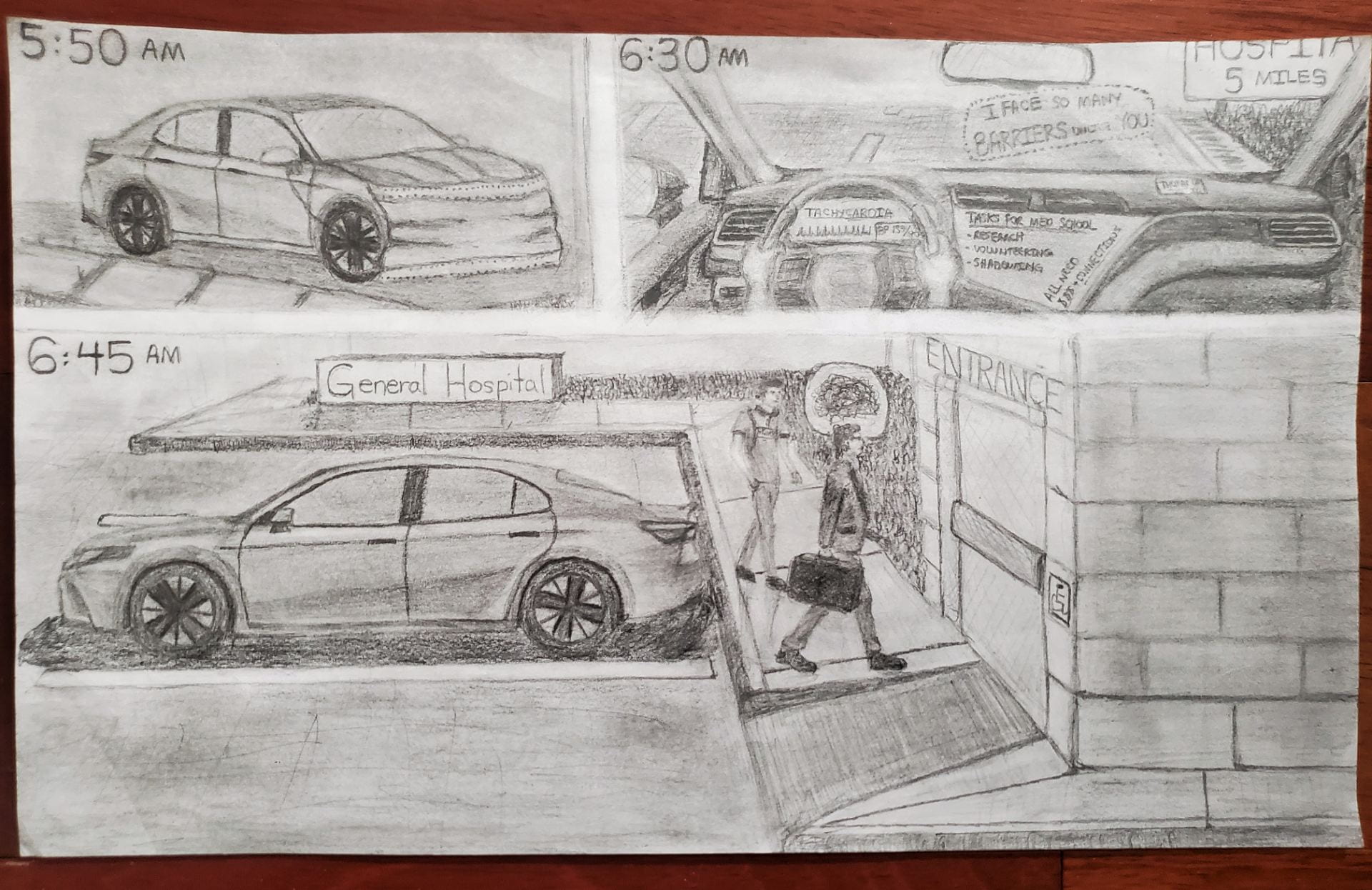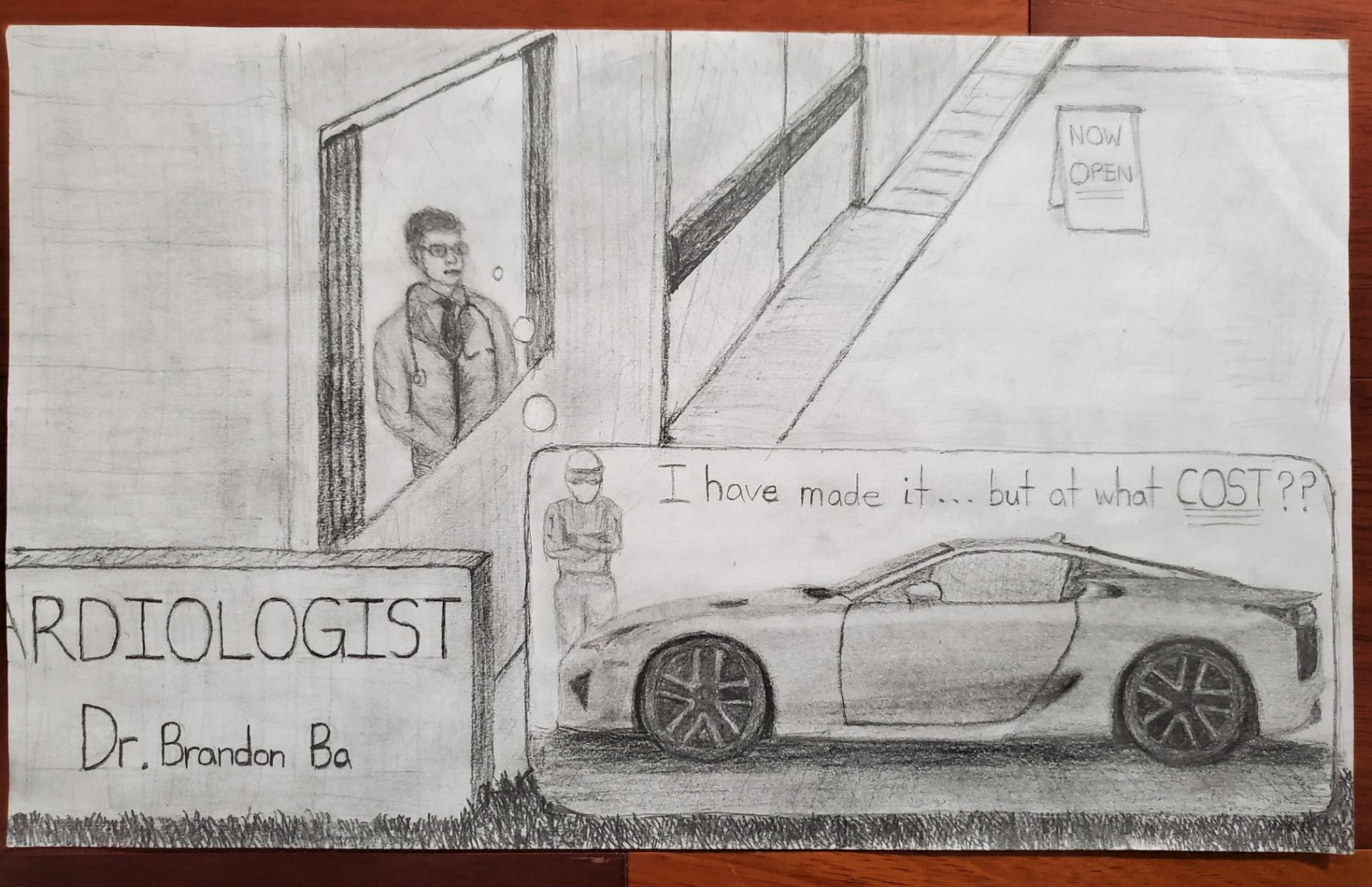Filial Piety: Who is really in the driver’s seat?
Abstract
In the transition to adulthood, many young adults decide to pursue a certain career. This decision is influenced by numerous factors—to varying degrees—including the desire to satisfy not only personal aspirations but also familial obligations. To further muddle this balance, individuals must navigate an uneven playground that provides advantages to some but not others. All together, these aspects have influenced my own tumultuous experience as the son of doctors in a Southeast Asian family, revealing the constraining nature of filial piety and intergenerational perpetuation of class structure. By reflecting on these issues, vignettes (and their associated graphite/colored pencil illustrations) will be created to track my development in an alternate reality. In my alternate reality, my driving question is: what would happen if my wishes were at odds with the wishes of my parents? Specifically, my inner conflict manifests as the struggle to pursue a personal passion in automobiles and to comply with the expectations of parents, who wish for their son to head into medicine and provide ample resources to do so. My funneling into medicine will focus on three key points in my alternate life: childhood, young adulthood, and adulthood. In my progression, personal ambitions are first developed and subsequently abandoned due to parental invasion, causing compliance and internal turmoil. To guide my work, several resources were utilized, including journal articles and books that detail a similar dissatisfaction with filial piety, class structure and its impact on medical school admissions, and example vignettes. By synthesizing my personal experiences with relevant literature, my intentions are to highlight the consequences of internalizing others desires and advocate for a more equitable medical school application process. Ultimately, my work captures the dilemma between obedience/obligation and agency infused with a side class inequality.
Content
Childhood
I was consumed by the rumble of the engine and felt the car wanting to be unleashed. The well-oiled machine joined many others like it, creating a formation that rivaled the honeycombs of honey bees. However, unlike the honey bees, we would not be working together; we would be racing each other. The tension was perceptible as the steering wheel trembled under my control. I anxiously sat in the firm seat and was already sweating in my claustrophobic racing suit. I was surrounded by a sea of barren metal; the interior stripped beyond recognition to most people. Beyond the gleaming metal, I saw seconds tick away slowly, and I waited on edge to provide the spectators the show they dearly wanted. I was the star of the show. I knew it. I just had to prove it. The seconds became milliseconds and the moment we had all been anticipated arrived: the green flag.
The cars came to life as the engines roared in a raucous symphony—my car did not. Instead, I heard the familiar creaks and thuds on the wooden floor become louder and louder. I was at home, not the racetrack. My dad came into check on me, still in his scrubs as he came from work. His eyes revealed his tiredness, but I also sensed his disappointment, especially after he recognized the untouched toy medical kit he bought for my birthday.
He stared at me in silence. Moments before, I waited in excitement. Now, I waited in agony, hoping that my dad would not be too harsh. He eventually sighed, uttering,
“You have not touched the birthday gift. Why aren’t you interested in saving lives?”
He turned away from me, leaving with the same creaks and thuds he came in with. I pondered his pleas, eventually settling on: racing…to save lives?
Young Adulthood
Crisp air, later sunrises, falling leaves—fall was finally here. After months of brutal Texas summer, I was ready for some respite from the heat. Even with this break, I still barreled along my journey towards a career in medicine, and shadowing my dad was up next on my to-do list.
It was 5:50 a.m. I left home in the wee hours of the morning, persevering through the tiredness. As the first few rays of sunlight pierced the darkness, I turned towards my car, revealing what appeared to be a giant surgical mask over the front of my car. Was it another warning from my parents to entrap me in medicine? Befuddled, I rubbed my eyes and took a closer look. On second glance, everything was normal, and I chalked the strange sight to my tiredness and carried on.
I started my trek to a familiar place: Thomas’s house, as he asked to shadow with me. The familiar drive was uneventful, but Thomas didn’t seem like his usual self when I greeted him. He was more reticent and somber, and I thought that morning grumpiness was a contributing factor. However, when he finally spoke, I was wrong.
“I am appreciative of your help, but I think it is unfair that,” he paused, seemingly uncertain how to continue, “that there are huge barriers for me to become a physician. After all, I don’t have any relatives who work in the medical field. I don’t have parents who can afford the expensive MCAT prep courses and the costs associated with medical school and college. Hell, I don’t even have a car or a suit or the support you have…”
He’s right. I knew he faced more difficulties than I did, but we rarely delved into detail about them. That wasn’t the case now, as the elephant in the room materialized in a matter of seconds, making its weight felt in the car. Reality occurred in slow motion, and I felt myself burning up inside from a mixture of anguish and embarrassment. How could someone who doesn’t even know if he wants to be a doctor has more opportunities than someone who has a fiery passion for it? I felt guilty for being spoon-fed this entire time, but I would feel even guiltier if I didn’t use the opportunities I had to my advantage and didn’t try my best to be a good son.
It was 6:30 a.m. I shook myself back to the present, and focused on the speedometer, which suddenly displayed my heartbeats. I couldn’t tell if the car sensed my frantic heartbeats or my passion towards the automotive industry, but I certainly felt the weight of my decisions. I glanced towards the infotainment display, which now only visualized the incessant to-do list for pre-medical students. I was slowly drowning in my own thoughts. I struggled to regain rationality, and though the speedometer reverted to normal, Thomas’s comments still loomed in the air. I mustered a meek response in return,
“You are absolutely right, and I am sorry that you have to face these challenges I don’t. I know what becoming a doctor means for you, and I will try my best to support you in your journey. I promise.” He nodded his head in response as the tension in the car appeared to ease.
It was 6:45 a.m., 15 minutes before my dad’s shift started. We arrived at the hospital and Thomas was thankfully in a better mood. As we entered the hospital, I had a lot to ponder.
Adulthood
All my years of training and education have brought me to this one moment, but I still feel empty. I have been certified to be a cardiologist, but I don’t think I can treat one heart—my own. My heart should be filled with joy and excitement; instead, it is filled with longing and aching. I fulfilled my parents’ wishes; I don’t feel as if I have satisfied mine. I have made it…but at what cost?
References
Cohen, Jordan J., Barbara A. Gabriel, and Charles Terrell. 2002. “The Case For Diversity In The Health Care Workforce.” Health Affairs 21 (5): 90–102. https://doi.org/10.1377/hlthaff.21.5.90.
Dos Santos, Luis Miguel. 2020. “I Am a Nursing Student but Hate Nursing: The East Asian Perspectives between Social Expectation and Social Context.” International Journal of Environmental Research and Public Health 17 (7). https://doi.org/10.3390/ijerph17072608.
Kahn, Marc J., and Ernest J. Sneed. 2015. “Promoting the Affordability of Medical Education to Groups Underrepresented in the Profession: The Other Side of the Equation.” AMA Journal of Ethics 17 (2): 172–75. https://doi.org/10.1001/virtualmentor.2015.17.2.oped1-1502.
Perrucci, Robert, and Earl Wysong. “Class in America.” In The New Class Society: Goodbye American Dream?, 135-148. Lanham, MD: Rowman & Littlefield, 2003.
Shi, Jinqun. 2017. “The Evolvement of Family Intergenerational Relationship in Transition: Mechanism, Logic, and Tension.” The Journal of Chinese Sociology 4 (1): 20. https://doi.org/10.1186/s40711-017-0068-z.



